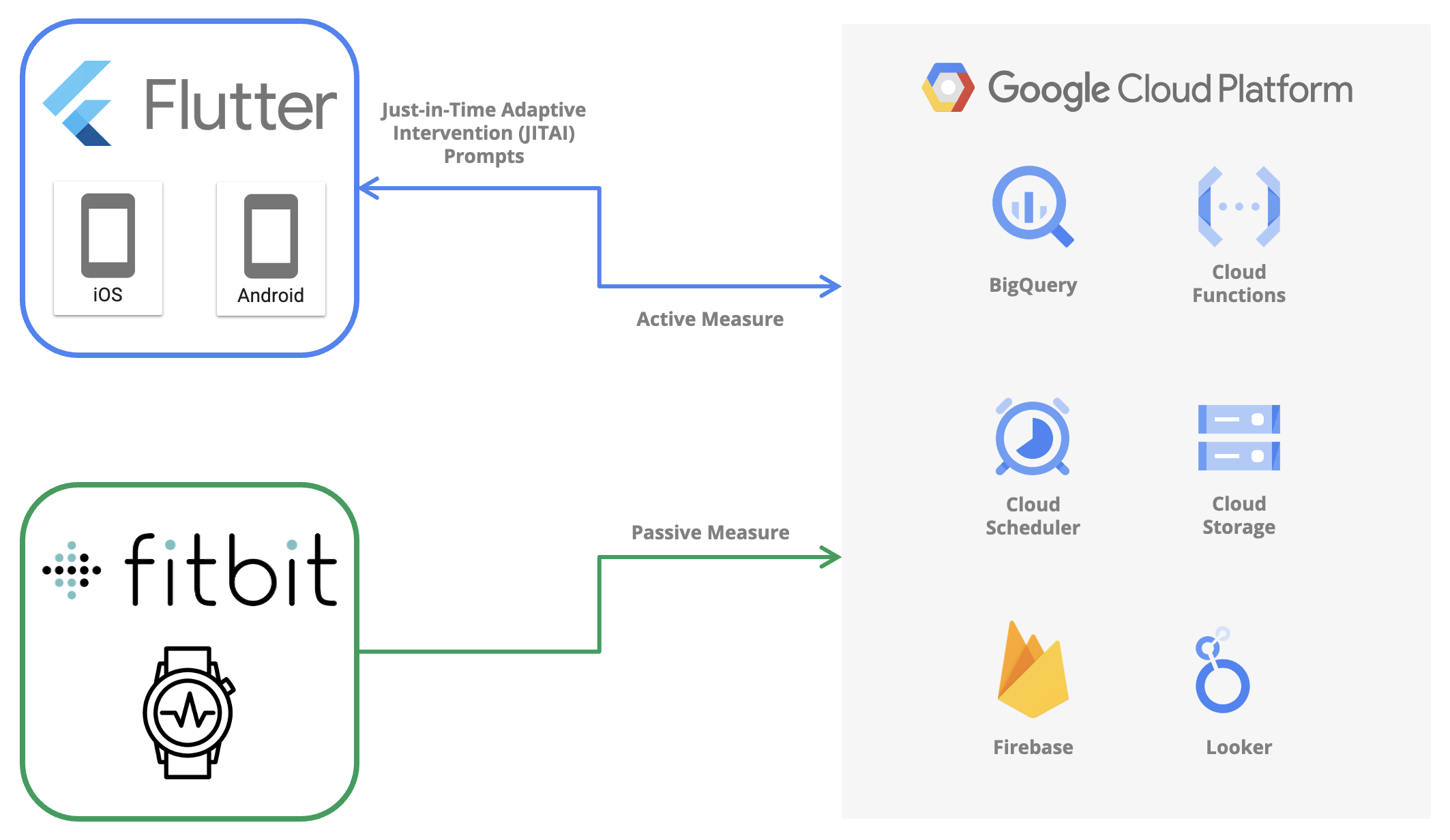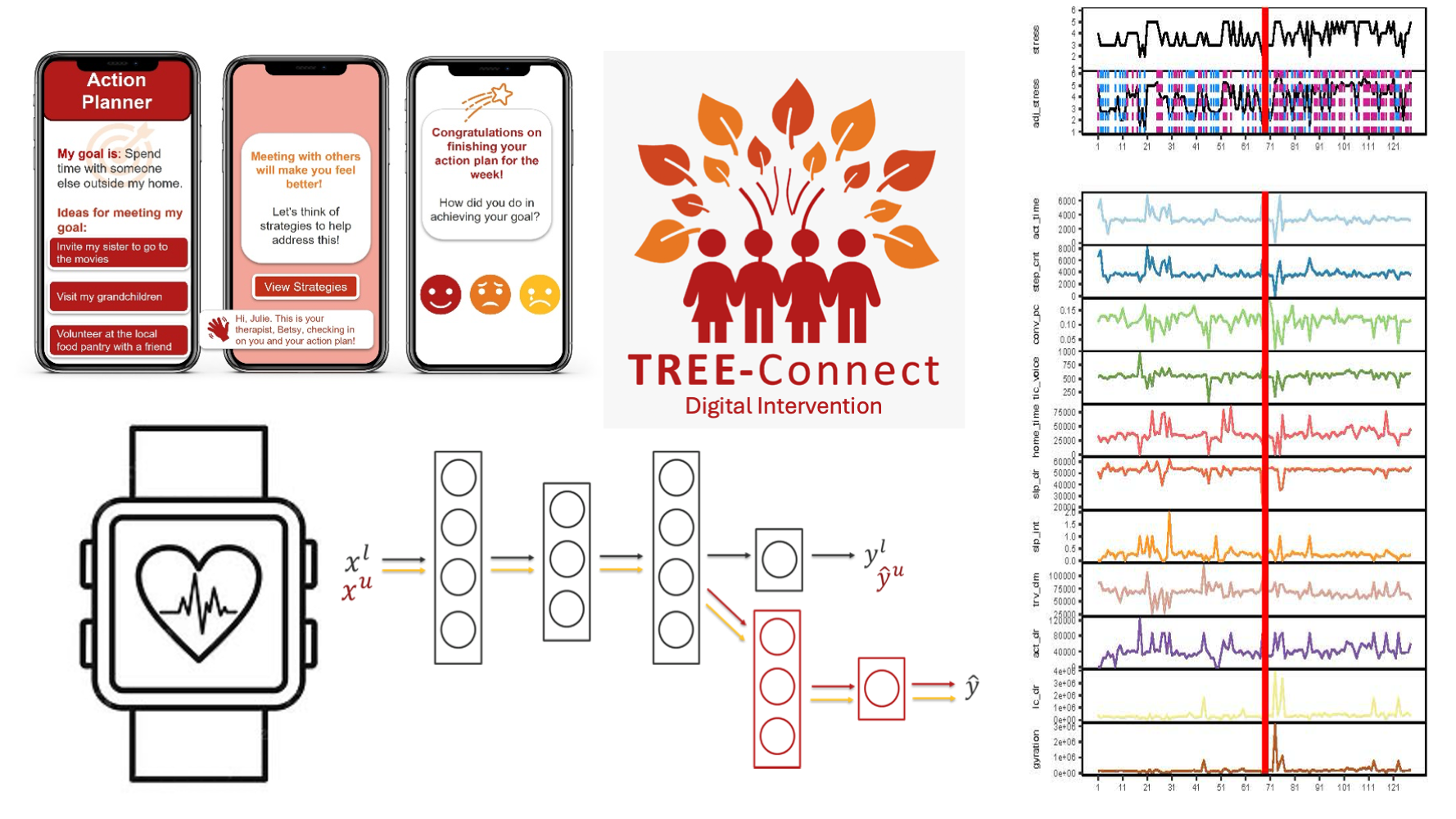
Our lab focuses on digital phenotyping, digital biomarker discovery, and the development of digital interventions for mental health with mHealth data, predicting health outcomes with big data, identifying sub-groups of treatment responses using machine learning techniques, clinical trials in mental and behavioral health, and multivariate methodology.
Digital Phenotyping with mHealth Data
Utility of mHealth Data
Recent advancements in mHealth technology have increased the potential of research studies to collect behavioral data on participants in their natural environment through active sensing (through frequent surveys via an app) and passive sensing (obtained through the sensors of the devices) data. We have explored the potential utility of passive sensing data collected with smartphone to assess fluctuations in daily functioning in real time during psychotherapy for late life depression in elder abuse victims (see here).
mHealth Pre-Processing Algorithm
The massive amount of longitudinal data collected on each individual is complex and has a high degree of missing data. We have developed a pre-processing algorithm (2SpamH) that identifies under-recorded passive data as missing.

Step-by-step illustration of the 2SpamH algorithm, with each point representing a daily observation of step count (red = missing, blue = non-missing).
Patterns in Passive Data & Clinical Improvement
Using the pre-processed data, we have developed a functional data analysis framework to visually represent and analyze patterns in passive data over time and predict behavioral activation from passively collected activity data (e.g., step counts). We showed that daily step counts are associated with clinical improvements in behavioral activation during psychotherapy.
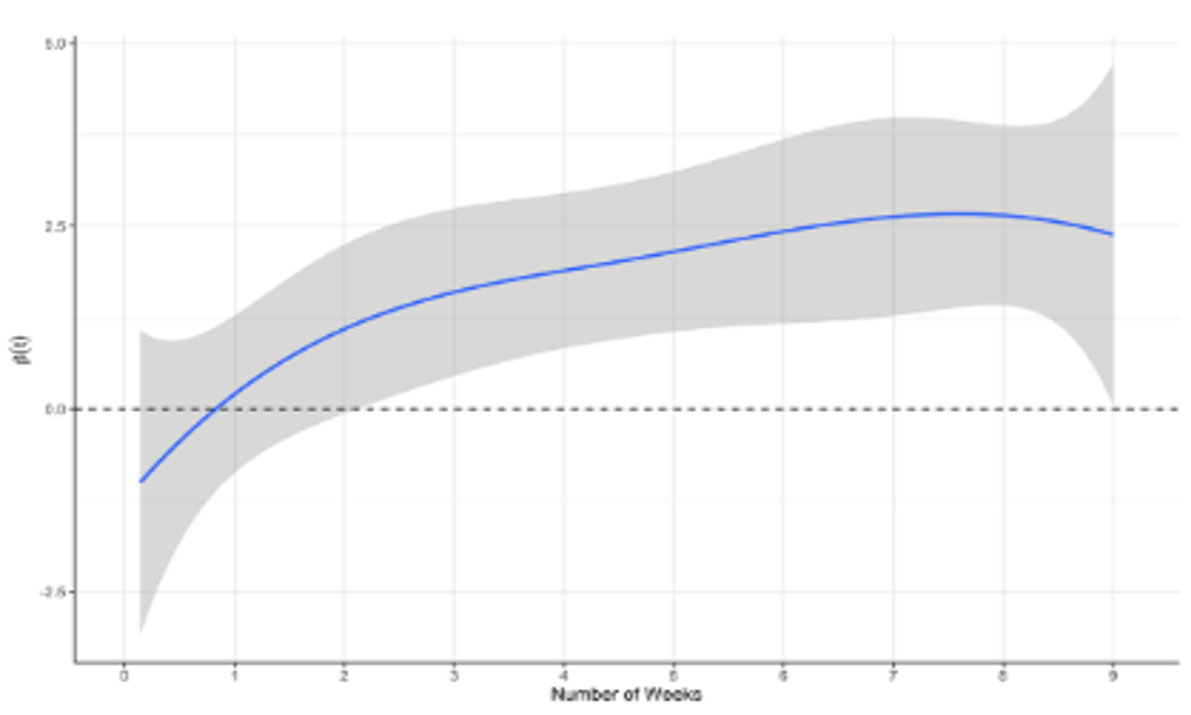
Regression coefficient profile (y-axis) over time of step count and clinical improvements in behavioral activation using Functional Data Analysis.
Prediction of Psychotherapy Adherence
We are also developing prediction models that apply a specialized branch of machine learning (semi-supervised learning) to predict adherence to psychotherapy among older adults with depression using deep-learning models and support vector machines with mHealth data. We have incorporated these models in digital interventions (see TREE-Connect below).

Stress Detection using Passive Sensing
See our new manuscript, recently accepted at Statistics in Medicine, A co-segmentation algorithm to predict emotional stress from passively sensed mHealth data. For the psychotherapeutic purpose of older adults who have chronic pain and depression, it is crucial to prevent the onset of emotional stress periods by detecting early signs of stress. We developed a data-driven co-segmentation algorithm of passively sensed and self-reported active variables collected through smartphones to identify emotionally stressful states. Our method leverages the association between the different types of time series. Our approach first segments the passive sensing variables by detecting their change points, then examines segment-specific associations with the active variable to identify co-segmented periods that exhibit distinct relationships between stress and passively sensed measures. Our findings indicate that our data-driven segmentation algorithm identifies stress periods more accurately than traditional ML methods that do not incorporate segmentation. With this algorithm, we plan to develop a just-in-time, adaptive intervention (JITAI) to prevent the experience of an emotionally stressful period in middle-aged and older adults with chronic pain and depression.
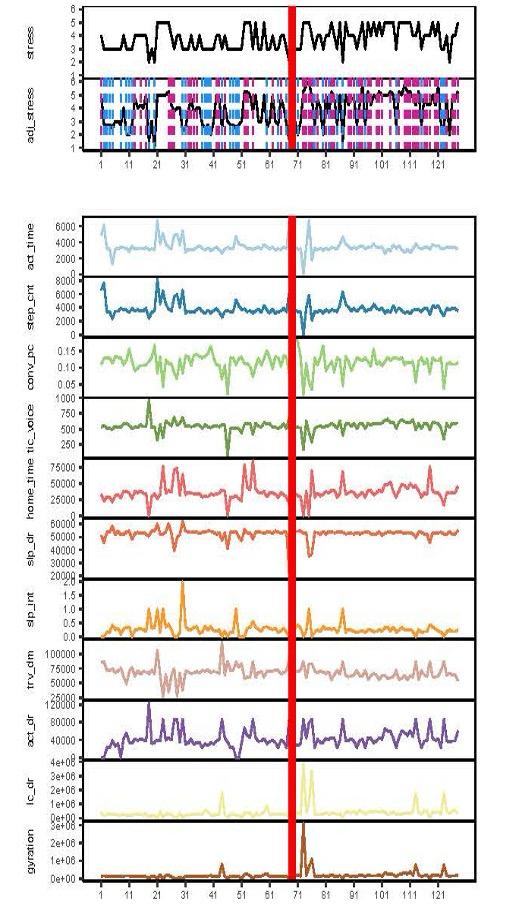
Patterns in passive data that predict the onset of emotional distress.
Some of this work is ongoing or in peer-review:
- Solomonov N, Zhang H, Kim S, Carter E, Lee J, Yu Z, Sirey JA, Kiosses D, Alexopoulos G, Banerjee S (2024) Passive Sensing Activity Levels is Associated with Self-Reported Behavioral Activation in Psychotherapies for Late Life Depression
- Banerjee S, Kim S, Carter E, Wu J, Kim Y, Wu Y, Zhang H, Solomonov N, Gunning F, Kiosses D, Sirey JA, Choudhury T, Alexopoulos G (2024) Prediction of Adherence to Psychotherapy with mHealth Data using Machine Learning
Digital mHealth Interventions
TREE-Connect
In collaboration with Dr. Nili Solomonov, we have developed the TREE-Connect intervention that reduces the number of sessions of the Engage and Connect psychotherapy for depressed older adults and adds an machine-learning powered prompt to promote adherence (see Prediction of Psychotherapy Adherence above). The TREE-Connect app incorporates prediction models in a just-in-time digital intervention to promote adherence to psychotherapy. We are currently proposing to test the intervention in a clinical trial that is part of our renewal proposal for our Weill Cornell ALACRITY Center. Our goal with the TREE-Connect app is to extend reach, reduce patient and therapist burden, and enhance adherence. Our prediction models and the just-in-time digital intervention can also be added to any existing psychotherapy.
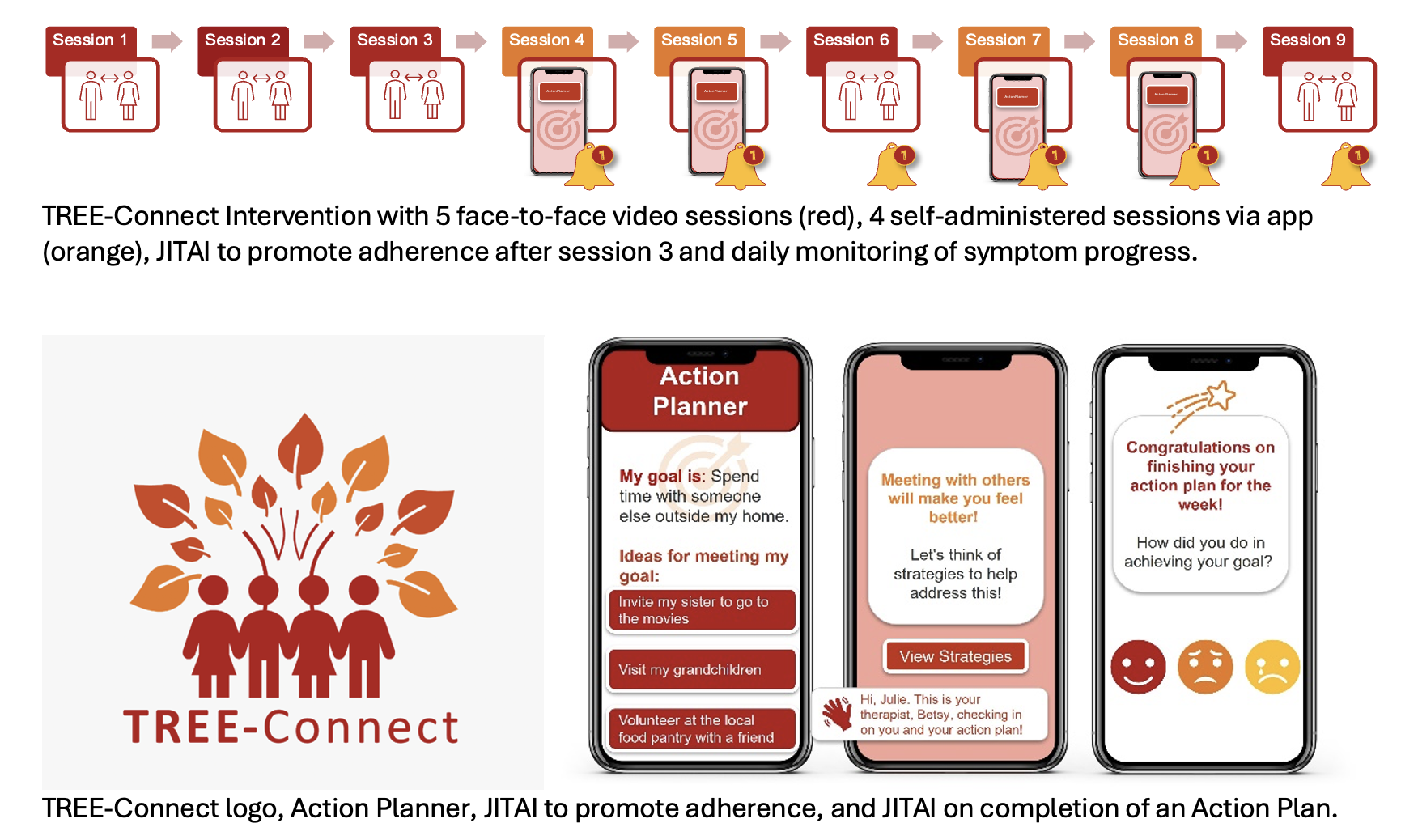
Flowchart of the TREE-Connect devices and platforms.
WellPATH
In collaboration with Dr. Dimitris Kiosses, we developed the WellPATH tablet app that implements WellPATH, a personalized mobile intervention for depressed older adults with suicidal ideation. WellPATH is a novel tablet-app intervention that aims to reduce suicide risk by employing simplified, personalized, easy to administer and use, cognitive reappraisal strategies during emotional crises and at scheduled brief training sessions. The WellPATH intervention is based on the assumptions that using personalized cognitive reappraisal techniques during an emotional storm, and practicing these techniques during scheduled training sessions will increase cognitive reappraisal ability and reduce suicide risk.
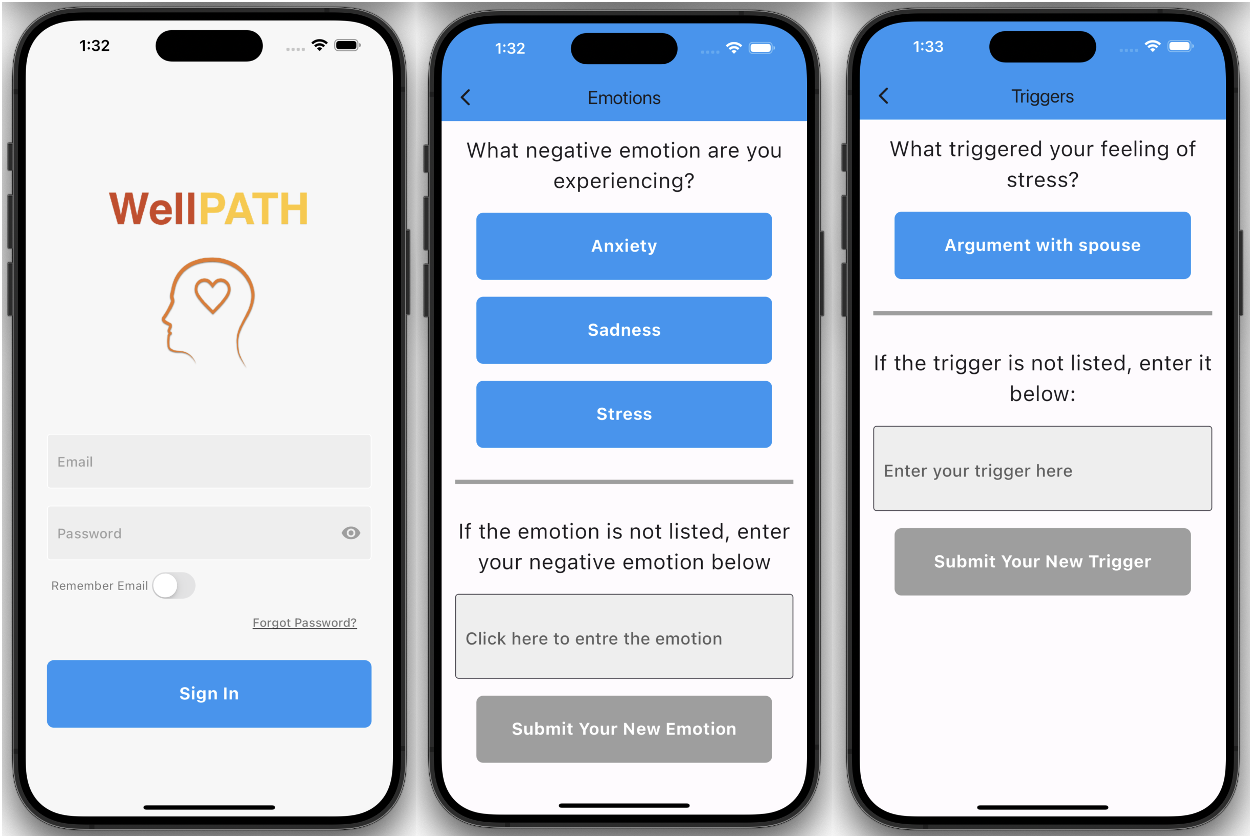
WellPATH app homescreen, negative emotion list and personalized trigger list.
EMA-PAL
In collaboration with Dr. Daniel Shalev, MD and Dr. Irina Mindlis, PhD, MPH from the Division of Geriatrics and Palliative Medicine, we have developed EMA-PAL, a web-based intervention to improve how symptoms are monitored and managed in outpatient palliative care. EMA-PAL collects real-time symptom reports from patients using short, secure surveys and provides interactive feedback through simple visualizations. Clinicians can view these data on a provider-facing dashboard, supporting timely, data-informed conversations during clinical visits. Our goal with EMA-PAL is to reduce recall burden, capture under-assessed symptoms such as anxiety and depression, and enhance communication between patients and providers. By gathering data in the moment, EMA-PAL promotes more accurate symptom assessment and strengthens shared decision-making.
EMA-PAL is being tested in an exploratory study, Ecological Momentary Assessment to Improve Symptom Management in Palliative Care. Patients and providers participate in interviews and co-design focus groups to shape the platform and provide feedback on its usability. The study aims to understand the feasibility and acceptability of EMA in palliative care, and to create a patient–clinician dashboard tailored to this setting.
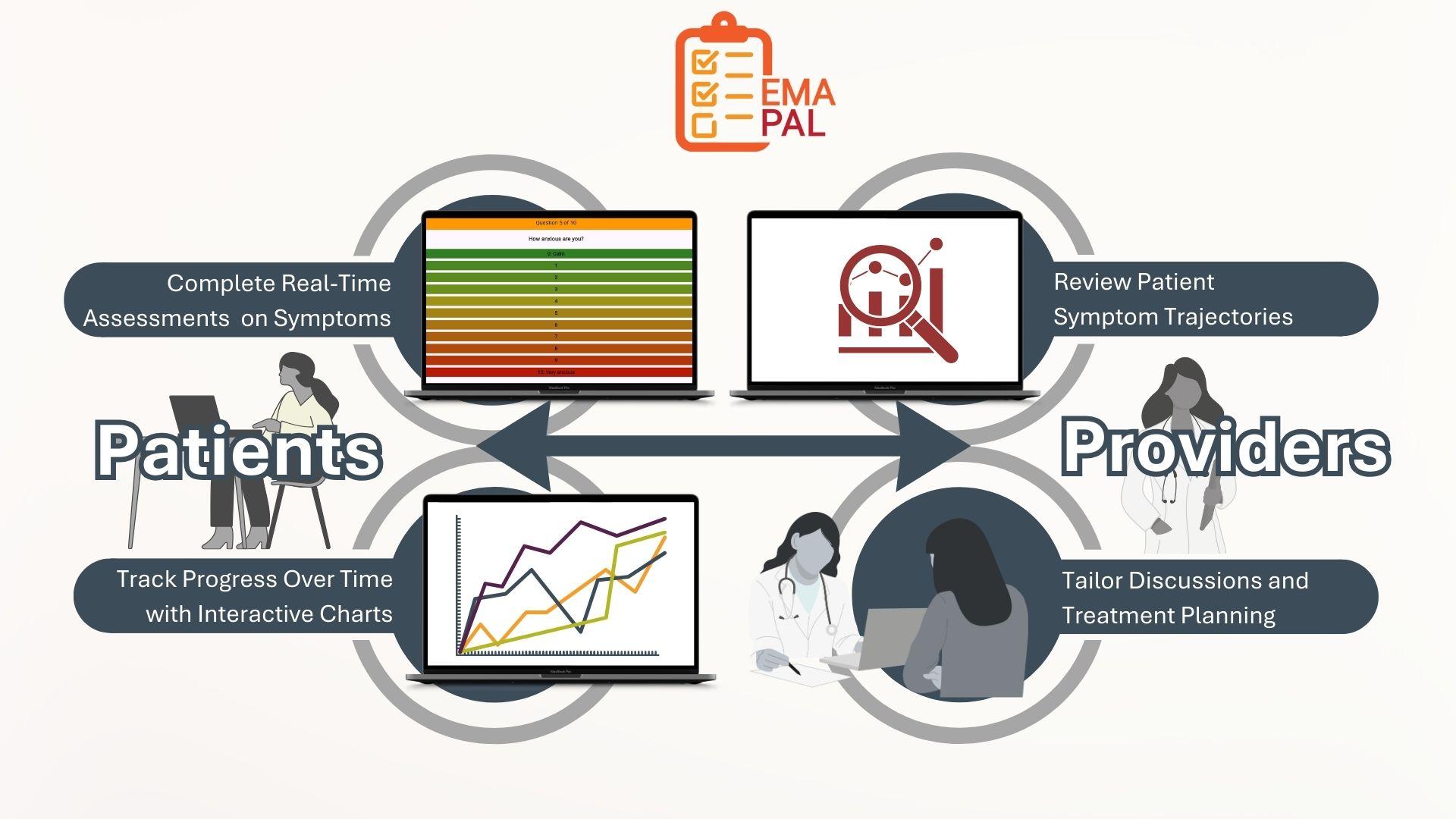
EMA-Pal allows patients and providers to track real-time progress and tailor treatment discussions.
Engagement with Technology
Our team has also studied the effects of modifications to the digital intervention tools, through usability-centered design and gamification, on improving usage of digital interventions and adherence to psychotherapy. In a sample of depressed older adults, participants receiving behavioral activation-based therapy, a 20% increase in therapy homework completion rate between assessments significantly reduced depression severity (MADRS) at follow-up assessment.
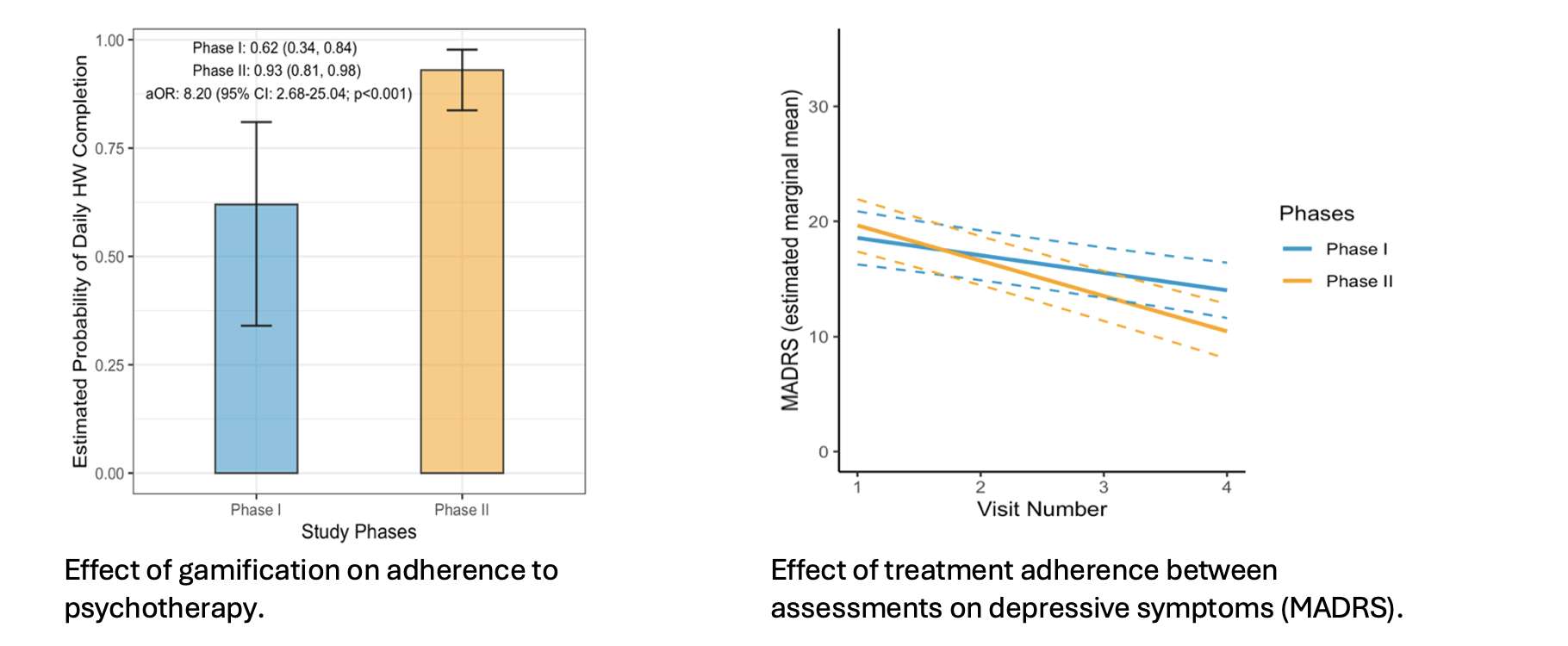
We also explored the specific patient characteristics associated with these factors, so further testing and tailoring could benefit the subpopulations with lower engagement and adherence.
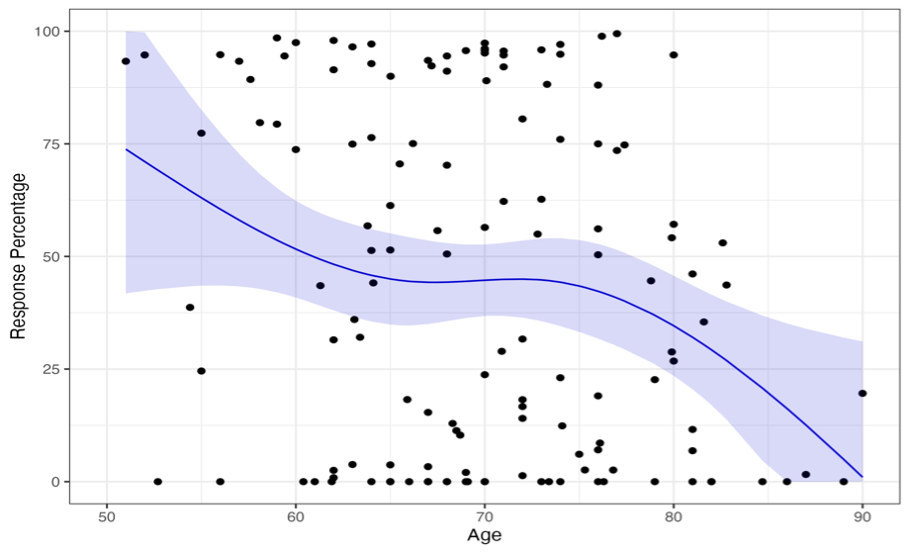
Association between age and engagement with digital assessments.
Some of this work is ongoing or in peer-review:
- Qiu Y, Carter E, Benda N, Sirey JA, Kim S, Kim Y, Yu Z, Kiosses D, Marino P, Alexopoulos G, Gunning-Dixon F, Banerjee S (2024) Gamification via mHealth to Improve Adherence to Psychotherapy and Clinical Outcomes in Depressed Older Adults. (under review in AAGP).
Identifying Sub-Groups of Treatment Responders using Machine Learning
Participants in clinical trials of psychotherapy and pharmacotherapy have heterogeneous response pathways to treatment. To this end, we have identified sub-groups that have distinct trajectories of symptoms using latent growth curve modeling. We have then used machine learning algorithms to identify these trajectory sub-groups from baseline characteristics. These analyses have informed novel targets of interventions (predictors of sub-groups). We have identified subgroups of participants with remitted major depressive disorder with psychotic features having distinct trajectories of depression severity during continuation treatment and to detect predictors of membership to the worsening trajectory (see here).
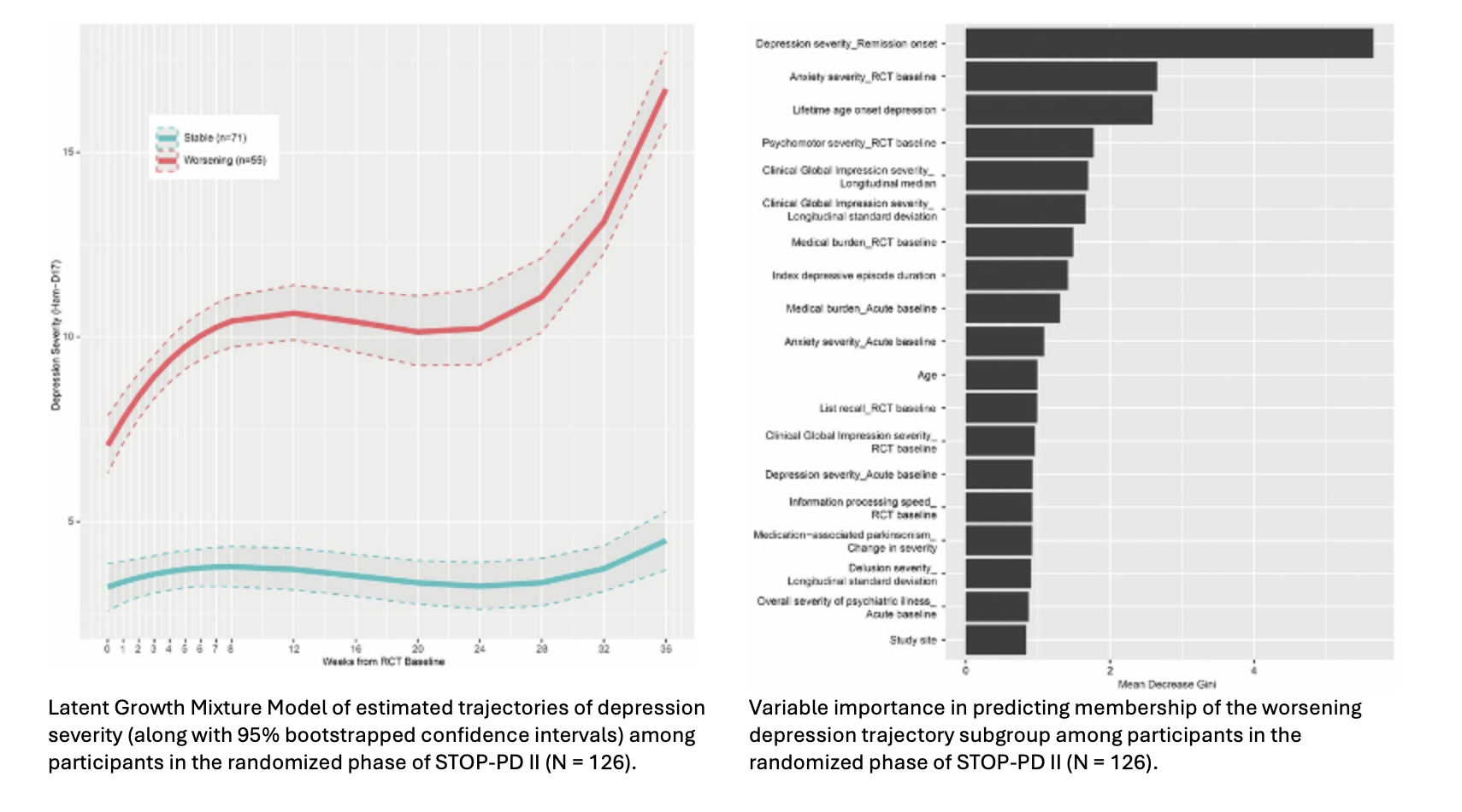
Our lab has also investigated predictive models for sub-groups in psychotherapy for major depression with suicidal ideation, executive dysfunction, and chronic obstructive pulmonary disease on quality of life and dyspnea-related disability.
Predictors of Health Outcomes including Social Determinants with Big Data
We are conducting several studies that utilize “big” real-world data (e.g., health insurance claims, electronic health records and registries) to develop predictive models on various health outcomes. Specifically, we have used health insurance claims to study adverse mental health outcomes and preventable hospitalization among depressed middle-aged and older adults (see here), the effect of social deprivation on clinical and demographic risk factors for suicidal ideation and suicide attempts among US youth and older adults (see here), and healthcare utilization patterns of patients before and after a psychiatric hospitalization (see here). We have used a COVID registry and the New York City-wide electronic health record repository (NYC-CDRN) to explore the relationship between social deprivation and COVID-19 acquisition (see here). We also harmonized longitudinal predictors from electronic health records (e.g., laboratory values, vital signs, diagnostic history) of hospitalized COVID-19 patients to predicts clinical deterioration (see here).
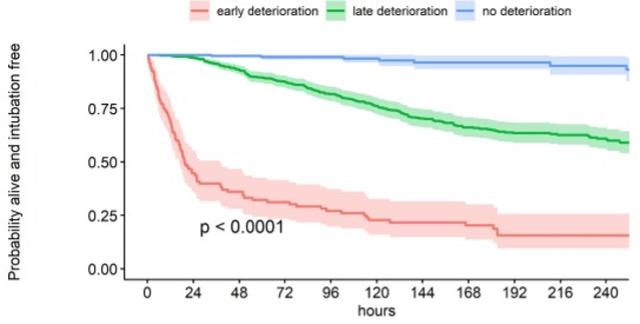
Kaplan-Meier estimates of survival without intubation by risk profile of clinical deterioration.
Clinical Trials in Mental and Behavioral Health
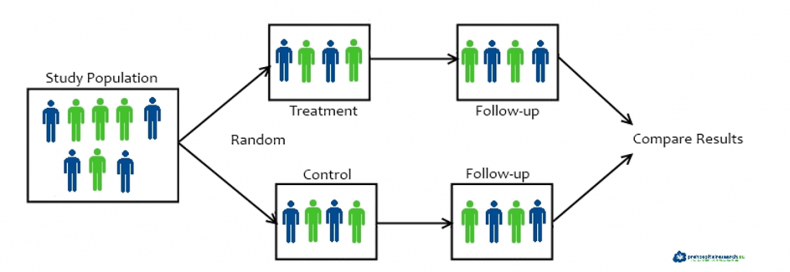
We designed and analyzed several randomized trials (including cluster randomized trials) which studied behavioral interventions in late-life major depression and pharmacotherapy to treat psychotic depression and mania in older patients with bipolar disorder, as well as adherence to antidepressant medication. One salient statistical feature of such trials on older adults is a high degree of missing data. We have incorporated state-of-the-art statistical techniques, such as pattern mixture models and shared parameter analysis, to account for such issues.
Multivariate Methodology
Medical research does not always analyze multiple correlated outcomes primarily due to the difficulty in interpretation and statistical complexity. Our team aims to understand the interplay between multiple correlated outcomes in determining treatment efficacy, mediating treatment effect, and discovering patient sub-groups. We have studied the estimation of the covariance matrix in higher dimensions and proposed an improved estimator shrinks the eigenvalues of the usual estimator (i.e., the sample covariance matrix) in two cases when (p<n i.e., dimension of the covariance matrix is less than the sample size (see here) and when (p>n i.e., dimension of the covariance matrix is more than the sample size (see here). We have developed a Bayesian multivariate model to detect genetic loci jointly affecting multiple correlated outcomes/traits. In the spirit of multivariate statistics, we have also developed methods for performing a multivariate meta-analysis of survival curves and applied them to distributed health network data, including the risk evaluation of total hip arthroplasty and total knee arthroplasty.
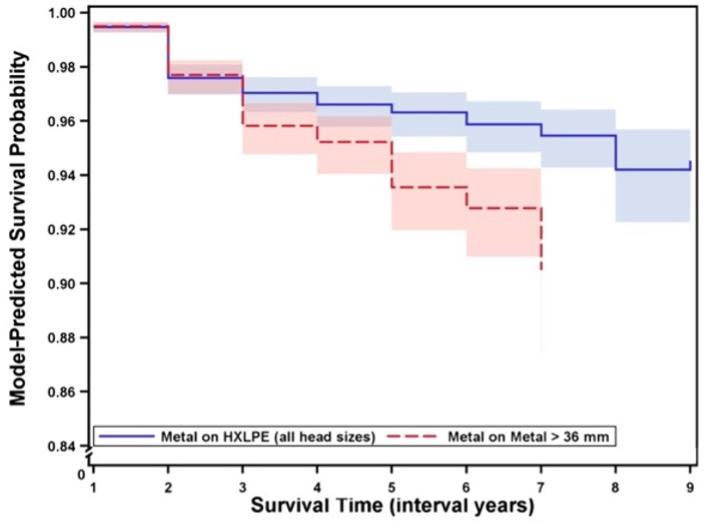
Kaplan-Meier estimates by arthroplasty type.


